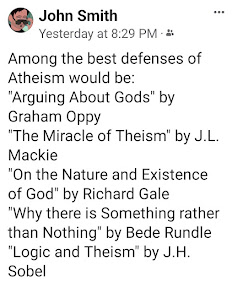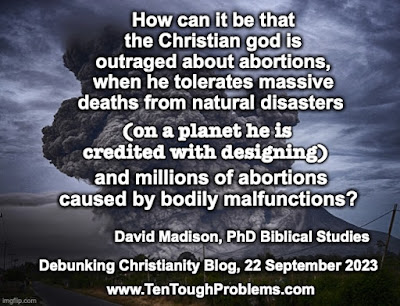[First published on 10/5/20] Because this is the haunted month of Halloween
here's something to spook ya all!
I'm always interested in new angles to argue my case
against Christianity. Kris Keys does that in the excellently researched
essay below. He argues there is more evidence for the resurrection of
Vampires and Revenants than there is for the resurrection of
Jesus.
Introductory comments by Kris Keys:
Well this is my first time writing a blog post and little
did I know it would be for the website Debunking Christianity!! I find
this to be completely hilarious as I am not in of myself militantly
opposed to Christianity in of itself; I tend to dislike Evangelicals but
that is because I view them as hypocritical and blatantly power hungry
but of course this description would not apply to all Christians. As
probably the readers of this post have deduced by now I am not a
Christian, but I am also not an atheist either. I tend to be rather
eclectic in my views. I fancy myself to be broad minded and open to
change.
I am a schoolteacher by profession, and I have taught both social
studies and science at the high school level. I have dual degrees in
both fields. In my not remotely enough spare time I enjoy reading
folklore, Medieval history, sociology, anthropology and other subjects.
Basically a lot of stuff. Over the years I have heard the
Christian argument for the physical resurrection of Jesus and at one
time I found this argument to be convincing, but more and more for many
varied reasons I became rather skeptical of it.
None of this explains though, how this essay came about! Nothing
remarkable about it really. I was scrolling through Facebook and I saw
John Loftus’s profile. In discussion with him I mentioned that one could
use the resurrection argument to demonstrate the existence of vampires
and I showed him a response I wrote to a friend of mine on this.
John asked me to do a write up
for him.
So here is a write up I never seriously figured I would write up on a
blog, one that I never suspected I would write for. So I hope everyone enjoys
it. So without further ado, here is my attempt to show that the
Christian argument for the resurrection of Jesus would also demonstrate
vampires exist. I will leave it up to you dear readers to determine if
Jesus rose from the dead and if you need to invest in crucifixes and
garlics now; or that perhaps claims of the dead returning bodily just
should not be given the benefit of the doubt. You decide.
I am a follower of John Smith at Facebook, who writes some very good provocative stuff. This Facebook post of his to the left provokes some thought too. He suggests a few works he considers to be the best defenses of atheism. They are all sophisticated philosophical treatises.
Sure, I'm a gadfly, but there are people who think the best atheist arguments come from atheist philosophers. Who or what is the source of this ignorance? Where does it come from? I think it comes from Christian philosophers themselves, because it can and does serve as a red herring leading people away from some powerful atheist arguments.
When I show up and offer a different perspective they treat me with a touch of tribalism, and/or they ignore me. It doesn't have to be that way. There is room for all types of argumentation from Biblical/Religious scholars and especially scientists.
Alex Pinkney graded philosophical arguments, since apparently, he considers them the best that atheists have to offer. He wrote:
Watch this then think, we don't even have an eyewitness of the resurrection of Jesus:
The traditional argument from evil claimed that God
was incompatible with any amount of suffering, for God could, and would want
to, prevent every instance of it. Most philosophers nowadays regard that as too
strong. A certain amount of suffering might be allowed by God, provided there
is a morally sufficient reason for his allowing it—provided, in other words,
the suffering serves some greater purpose or is the unavoidable consequence of
something that justifies its existence. For instance, it may be that our having
free will is a great good which more than compensates for any evil actions
resulting from that freedom. Or it may be that certain types of suffering are
the only way to bring about something of immense value. As an example of the
latter, it is possible that in order to freely develop into the sort of beings
that God wants us to become, we must first overcome certain challenges—and
these may include disappointments, feelings of frustration, and other
experiences we would prefer not going through. (As some theists put it, God’s intention
was not to create a paradise in which to keep us perfectly happy, but to create
a place where we can grow and develop into persons worthy of spending eternity
with him.) It is also possible that an instance of suffering today is the least
terrible means of preventing a far greater amount of suffering at some future
date. Each of these, as well as several other possibilities that will be
discussed below, provides a conceivable explanation for at least some of the
bad things that happen in this world.
But
even if God is not incompatible with all suffering, he is incompatible with
suffering that cannot be justified by some outweighing benefit. Such suffering
would be senseless or gratuitous, and if we are to take seriously the claim
that God is perfectly good as well as all-powerful and all-knowing, we cannot suppose
that he would let someone suffer without reason. If one has the ability to
prevent such pointless suffering, yet fails to do so, one cannot be considered
morally perfect. It follows that there can either be a God, or there can be
senseless suffering, but not both. This leads to a very simple argument in
support of atheism:
Every Monday morning I'm posting submitted essays, excerpts from my books, and some of the best posts of the past. Here's one from January 17, 2012.
This topic interests me to no end. Why don't most believers seriously question their faith? Does it take a special type of individual? Does it require some personality trait that believers don't have? Does that make skeptics different people? Could it be intelligence? Could it be that skeptics have a higher self-esteem than others? Is it that we don't need social approval? Is it that life's experiences have shown us we cannot accept the dominant opinion on a matter? Is it that we question what we're told in general? Perhaps, but when we look at skeptics in general there doesn't seem to be a set pattern. Perhaps a scientific poll might help answer that kind of question. What I do think is that the following ten reasons are almost certainly necessary conditions even if they are not sufficient ones:
My plan is to post something of interest every Monday morning. These posts will include excerpts from my books, submitted essays, posts made here in the past, and new ones. Enjoy.
The Trickster’s Apprentice
By David Eller
At the end of the first part of Thus Spake Zarathustra, Nietzsche has Zarathustra withdraw into his solitude, asking, “what matter all believers? You have not yet sought yourselves: and you found me. Thus do all believers; therefore all faith amounts to so little.” In a previous essay, I introduced the figure of the trickster, the mischievous, unrestrained, shape-shifting boundary-crosser to whom many pundits have likened Trump. I realize now that that essay was the first of a two-part musing on faith and following, inspired by this cross-cultural fact: people don’t usually follow tricksters. They may laugh at him (since, as I pointed out previously, a trickster is almost always a male, at least at first), they may be aghast at his disrespect of morals and traditions, they may dread his baleful influence. A trickster is always a destroyer, usually a creator, sometimes a buffoon or cautionary tale, but virtually never a leader. Who would choose the trickster’s world of chimeras, deceptions, and insatiable appetites?
I had said I would post on Mondays. I will do so! The posts just won't always be excerpts, past postings, or submitted essays. But for now, go ahead and share the most important reason you believe, or disbelieve. Go!
Every Monday morning I'm posting submitted essays, excerpts from my books, and some of the best posts of the past. This post today is one of the first ones I made to this blog back in 2006. Enjoy!
Many Christians will claim that atheists simply do not have an ultimate motivation for being good. What motivates an atheist to be a good and kind person? Why should we act morally? J.P. Moreland believes atheists can and in fact do good moral deeds, “But what I’m arguing,” he says, “is, What would be the point? Why should I do these things if they are not satisfying to me or if they are not in my interests? [Does God Exist: The Great Debate (Thomas Nelson, 1990), pp. 118].
C. Stephen Layman argues in a similar fashion. He points out that the main difference between secular and religious moral views are that “the only goods available from a secular perspective are earthly goods,” whereas a religious perspective “recognizes these earthly goods as good, but it insists that there are non-earthly or transcendent goods.” Secular ethics, he says, must pay for the individual here on earth. “By way of contrast with the secular view, it is not difficult to see how morality might pay if there is a God of the Christian type.” [The Shape of the Good: Christian Reflections on the Foundations of Ethics (Univ. of Notre Dame Press, 1991)].
My plan is to post excerpts from my books on Mondays. This will include excerpts from all of the authors too. I must resist the urge to revise most everything I wrote! Okay now, OPEN THREAD!
LINK!! [Please subscribe to my YouTube channel.]
I'd love to find a planet where people agree on facts! As evidence that Earth is not that planet, a recent poll found that 63% of Republican Party members in the USA continue to believe Trump's Big Lie that he won the 2020 election. There's a phenomenon in psychology called denialism, a person's choice to deny reality as a way to avoid a psychologically uncomfortable truth. There is also disinformation propagated by various individuals and organized groups with the aim of confusing people about the facts. For example, the disinformation campaign funded by fossil fuel companies and conservative think tanks has sown profound confusion about the facts of climate science, much as the Tobacco Institute earlier pioneered the same FLICC model to dupe people into doubting the health hazards of tobacco use. (FLICC: fake experts, logical fallacies, impossible / inconsistent expectations (demanding an impossible standard of proof from the other side while requiring little or no standard from one's own side), cherry picking, conspiracy ideation. I'd like to squeeze in a letter T for tribalism / team loyalty, but that would wreck the acronym.)
Religionists and denialists use similar methods, and are sometimes the same people. I suspect Trump's appeal to America's Christians is due to the preparatory work most of them received via religious indoctrination. They acquired the habit of trusting the verbal pronouncements of their team's authorities without evidence or fact-checking. All Trump had to do was move into the cognitive house already built.
As an example, suppose a street vendor offers to sell me a Rolex watch for $50. A check online shows Rolex watches selling for $12,000 and up (way up). By coincidence, the street vendor's "Rolex" comes with no kind of certification. Instead the street vendor says "Trust me." The vendor provides no other evidence of authenticity. I would have to take the vendor on faith, since I have no evidence that the "Rolex" is real.
A watch whose authenticity I must take on faith is less perfect than a watch whose authenticity carries a bit more heft, such as appraisals by multiple independent experts (who don't stand to benefit from the sale, and who stand to lose if they can be shown to be wrong), along with a certificate of authenticity from a credible organization that has an incentive to be honest (such as being sued for damages if it issues false certificates). In the event of a dispute, I could probably get a court of law to rule on the authenticity of an expensive watch.
While I would never actually buy a Rolex when a $20 digital watch keeps time well enough, this example shows how something I can verify as genuine to a high probability beats something I have to take entirely on faith.
You can see where I'm going with this. A God whose only evidence is the preacher's command to "trust me" is less perfect than any God (or, perhaps, any thing) that doesn't require faith. Especially when the preacher or vendor who says "trust me" stands to gain if I do.
Thus if I imagine a perfect God, in line with the Ontological Argument, I imagine a God who doesn't require me to rely on faith.
























